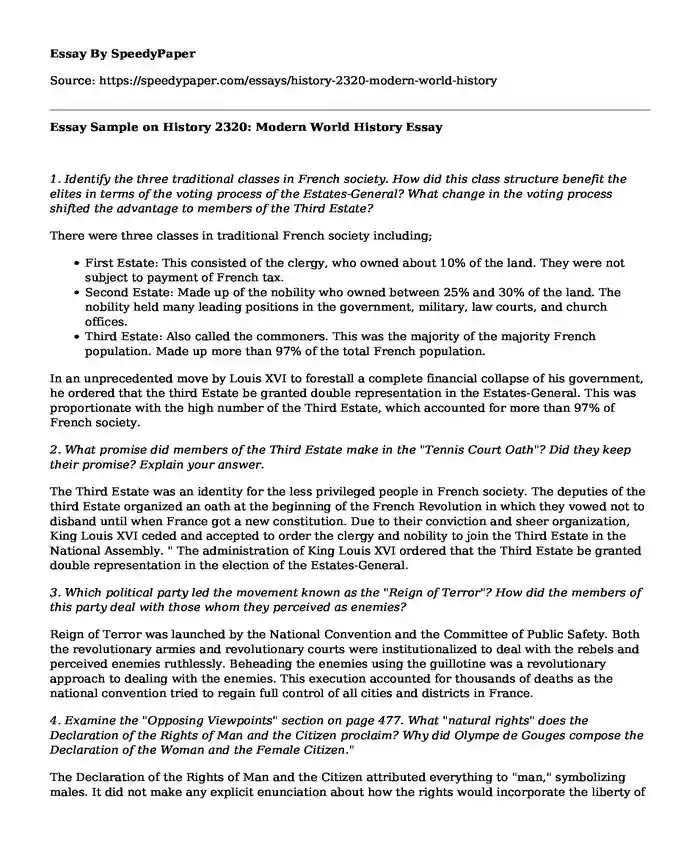
| Type of paper: | Essay |
| Categories: | Knowledge French Revolution |
| Pages: | 3 |
| Wordcount: | 775 words |
1. Identify the three traditional classes in French society. How did this class structure benefit the elites in terms of the voting process of the Estates-General? What change in the voting process shifted the advantage to members of the Third Estate?
There were three classes in traditional French society including;
- First Estate: This consisted of the clergy, who owned about 10% of the land. They were not subject to payment of French tax.
- Second Estate: Made up of the nobility who owned between 25% and 30% of the land. The nobility held many leading positions in the government, military, law courts, and church offices.
- Third Estate: Also called the commoners. This was the majority of the majority French population. Made up more than 97% of the total French population.
In an unprecedented move by Louis XVI to forestall a complete financial collapse of his government, he ordered that the third Estate be granted double representation in the Estates-General. This was proportionate with the high number of the Third Estate, which accounted for more than 97% of French society.
2. What promise did members of the Third Estate make in the "Tennis Court Oath"? Did they keep their promise? Explain your answer.
The Third Estate was an identity for the less privileged people in French society. The deputies of the third Estate organized an oath at the beginning of the French Revolution in which they vowed not to disband until when France got a new constitution. Due to their conviction and sheer organization, King Louis XVI ceded and accepted to order the clergy and nobility to join the Third Estate in the National Assembly. " The administration of King Louis XVI ordered that the Third Estate be granted double representation in the election of the Estates-General.
3. Which political party led the movement known as the "Reign of Terror"? How did the members of this party deal with those whom they perceived as enemies?
Reign of Terror was launched by the National Convention and the Committee of Public Safety. Both the revolutionary armies and revolutionary courts were institutionalized to deal with the rebels and perceived enemies ruthlessly. Beheading the enemies using the guillotine was a revolutionary approach to dealing with the enemies. This execution accounted for thousands of deaths as the national convention tried to regain full control of all cities and districts in France.
4. Examine the "Opposing Viewpoints" section on page 477. What "natural rights" does the Declaration of the Rights of Man and the Citizen proclaim? Why did Olympe de Gouges compose the Declaration of the Woman and the Female Citizen."
The Declaration of the Rights of Man and the Citizen attributed everything to "man," symbolizing males. It did not make any explicit enunciation about how the rights would incorporate the liberty of women. Olympe de Gouges believed that the declaration was systematically setting the ground for the progression of patriarchy, which was already deep in the French system. The Declaration of the Rights of Man and the Citizen emphasize equality, freedom from harm, freedom of expression, and property ownership. Prosperity is also guaranteed for all men. In her Declaration of the Woman and the Female Citizen, Olympe de Gouges clearly includes women into the Declaration of the Rights of Man. This was to tweak the declaration from one which entrenched existing patriarchy to a more open and liberal one for both male and females. In every point of the declaration, Olympe de Gouges adds "women." For instance, "No woman is an exception; she is accused, arrested, and detained in cases determined by law. Woby law like men, obey this rigorous law."
5. Read "Napoleon and Psychological Warfare" on page 480. What themes does Napoleon use to appeal to and inspire his soldiers? Do you believe Napoleon believes his words? Explain your answer.
Napoleon, in his psychological warfare tactics, used antithesis, rhetorical questions, and patriotic insinuations to inspire his troops. While alluding to the already great achievements that the troops made in annexing regions and conquering them, he painted a stark reality of the battles that are yet to be won. By articulating the hardships that the army endured to achieve their success so far, Bonaparte surreptitiously mirrored the impending challenges that the French army under his leadership still had to brace themselves for. The specific themes that Napoleon invoked in psychological warfare include patriotism, nationalism, military preservation, and triumph. He mentions, "All of you are consumed with a desire to extend the glory of the French people; all of you long to humiliate those arrogant kings who dare to contemplate placing us," which reinforces the sense of patriotism to the army.
Cite this page
Essay Sample on History 2320: Modern World History. (2023, Oct 10). Retrieved from https://speedypaper.net/essays/history-2320-modern-world-history
Request Removal
If you are the original author of this essay and no longer wish to have it published on the SpeedyPaper website, please click below to request its removal:
- Essay Sample on the Potential to Write at Your Best
- Free Essay with Nursing Student Tips
- Comparison Essay Sample: the Great Depression and the Great Recession
- Free Essay Example - My Social Impact
- Educational Practices in Ancient Greece and Rome. Essay Example
- Essay Sample on The Importance of Reading
- Essay Sample on Maus: Readings and Discussion
Popular categories




